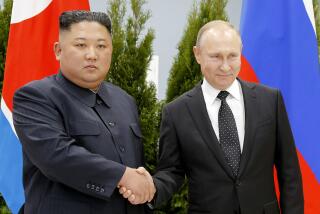Don’t Look to Summit to End Cold War
- Share via
There is something missing in the political atmosphere surrounding the forthcoming Washington summit meeting between President Reagan and Soviet leader Mikhail S. Gorbachev. Neither in this country nor in the Soviet Union is there any talk now of a new detente.
While the absence of euphoria seems fully warranted, political circumstances in both countries point to the likelihood of somewhat improved U.S.-Soviet relations after the intermediate-range nuclear force, or INF, agreement is concluded at the summit.
Reagan is in a hurry. If he is to go down in history as having successfully negotiated with Moscow from a position of strength, he needs additional agreements before the election season begins next summer. To demonstrate the validity of his military buildup, he will press for a new deal reducing strategic arms by 50%. He will also try to reach an understanding with Gorbachev about the neutralization of Afghanistan and about a substantial increase in the flow of Soviet emigrants.
Gorbachev is also in a hurry. His much-publicized perestroika --the radical restructuring of the Soviet economy--has not yet paid off. As the abrupt dismissal of his strongest supporter, Boris Yeltsin, has shown, the policy of glasnost , or openness, has not gone--and perhaps cannot go--as far as he would like it to go. What he needs, then, is some success in the realm of foreign policy. His deadline is the critical party conference that is scheduled for next June.
Accordingly, expect a busy season in U.S.-Soviet relations in the first half of 1988. Reagan is fighting for his place in history; Gorbachev is fighting for his primacy in the Kremlin.
What, specifically, 1988 will bring depends on what happens at the summit meeting and in its immediate aftermath. Generally speaking, there are three possibilities:
--The most likely is that the INF accord will be signed and ratified by the Senate. Most Democrats, who have always favored arms control, will support it. Most Republicans, though they will voice reservations, will ultimately support it as well. For one thing, they will find it politically too difficult to oppose their President. Moreover, if the economy turns sour as the elections approach, Republicans will have to claim to be the party of “peace” and forget about the “prosperity” angle.
To strengthen that impression, the President will also press at the summit for a “framework” on the reduction of strategic arms. Watch for subtle signs of compromise on both sides. That the accord, to be signed early next summer, will call for a 50% reduction in strategic weapons is a foregone conclusion. The compromise to look for then might consist of Moscow moving closer to the American position on the development and testing of the Strategic Defense Initiative, while Washington would move closer to the Soviet position on the long-term extension of the 1972 anti-ballistic-missile treaty.
--The second and less likely scenario is that an INF agreement is signed, but not much else is done or said at the summit meeting. In that case, the chances for a new era of accommodation will surely diminish. If the Senate should then delay ratification of the treaty, the chances for a strategic-arms accord in this decade or any improvement in relations will disappear altogether.
--The most desirable but least likely scenario is that Reagan and Gorbachev would begin to reach beyond arms control to settle outstanding political issues. Moscow’s interest in genuine accommodation would be signified by the withdrawal of Soviet forces from Afghanistan, the removal of the rusty Iron Curtain and the Berlin Wall from the heart of Europe, and by provisions ensuring the free flow of people from the Soviet Union. Washington’s interest in entering an era of constructive relations would be signified by the elimination of existing barriers to the expansion of trade between the two countries.
Despite Gorbachev’s skillful use of public diplomacy, such a turn of events is still highly unlikely. True, the Soviet leader has called Afghanistan a “bleeding wound,” defined Moscow’s relations with Eastern Europe in more tentative terms than his predecessors and hinted at new approaches to emigration. But deeds have not yet matched his words.
Thus, what will almost certainly remain on the U.S.-Soviet agenda is the resolution of difficult and elusive political issues, the most serious of which is still Soviet expansionism. The prospective reduction of nuclear weapons is a necessary but insufficient step toward genuine detente.
It is well to remember that political issues, not arms buildups, caused the Cold War and that only the resolution of such political issues, not arms reduction alone, can end it.
More to Read
Sign up for Essential California
The most important California stories and recommendations in your inbox every morning.
You may occasionally receive promotional content from the Los Angeles Times.













